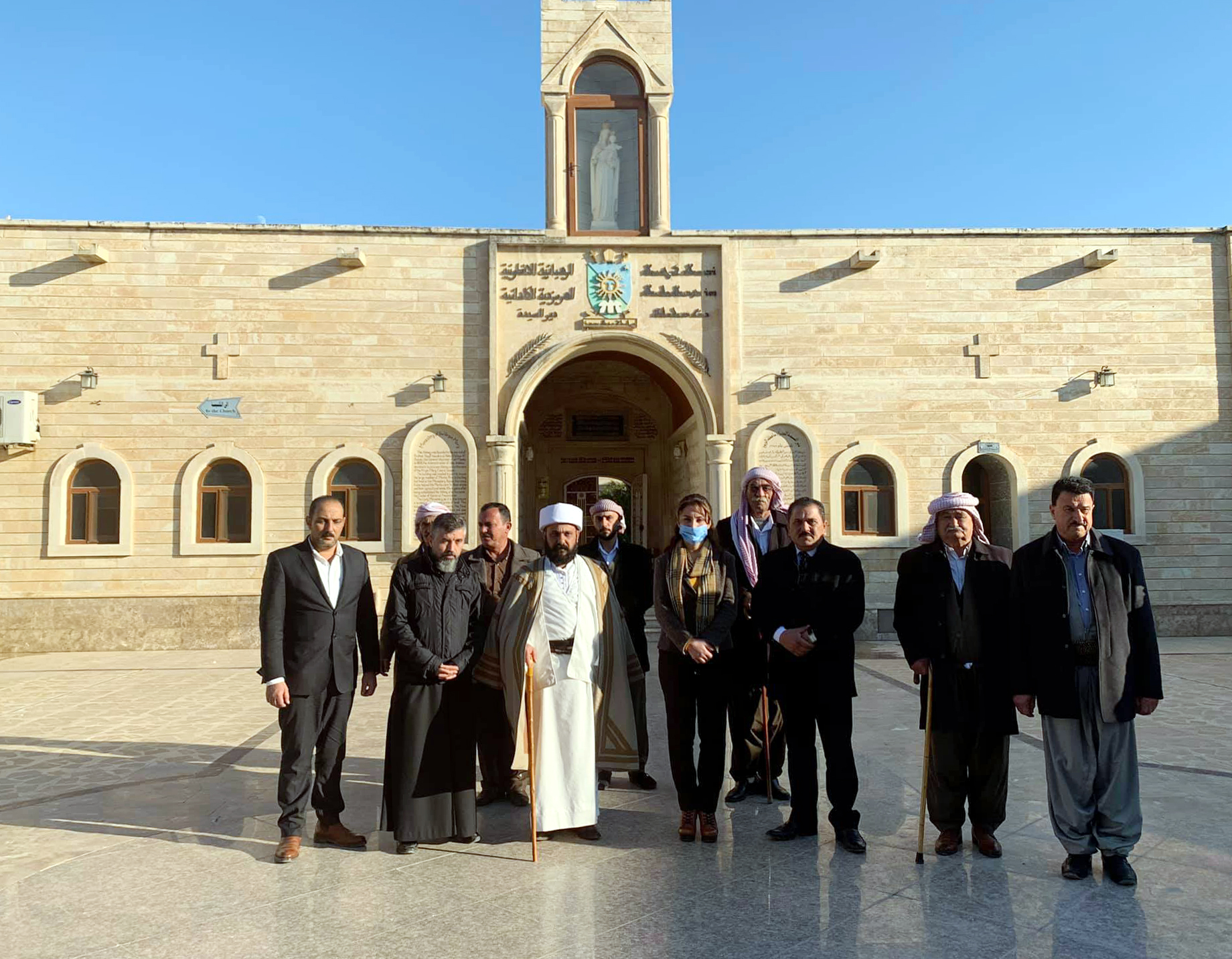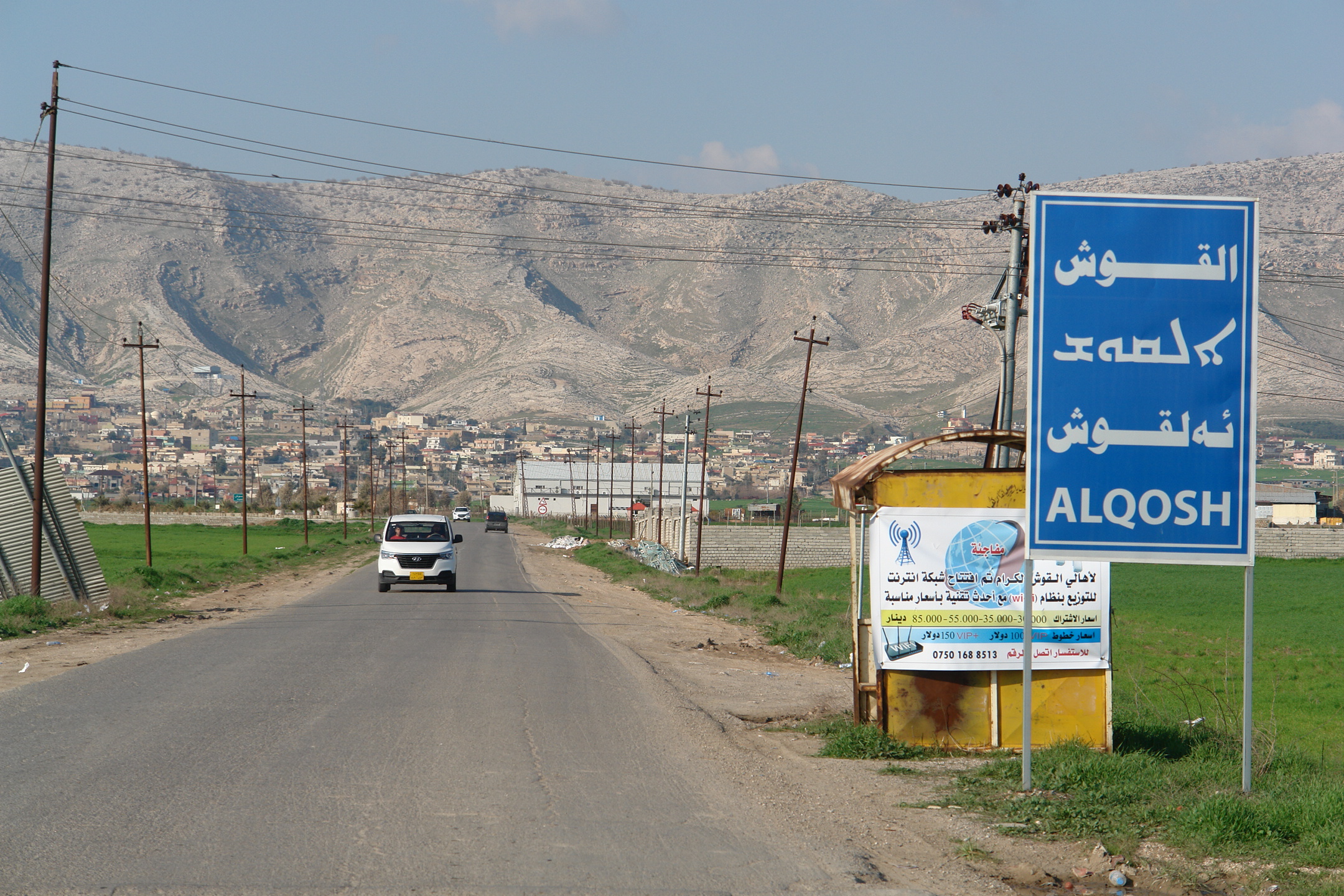A predominant Christian population with Ezidis religious minority and Muslims live together and worship peacefully since ages in Al-Qush sub-district.
The town is one of the disputed areas Between Iraqi government and the Kurdistan Regional Government KRG and passed through tough times yet it has never affected its identity for peaceful coexistence, a characteristic it has acquired since years that made it a symbol for freedom of religions and cohabit.
“I remember 20 years ago there were no restaurants in al-Qush so any Muslim or Ezidi visitor, were hosted by Christians for meal and accommodation,” said Joseph Shamas, a 65-year-old resident of al-Qush.
Shammas is one of the original inhabitants of al-Qush. He says this fraternity is inherited from fathers and grandfathers. “We, Christians, Ezidis and Muslims live together like brothers. We visit each other especially in the social and religious rituals.”
“Our relationship is warm and pleasant. I can’t remember one day that we had any problems with our Ezidi and Muslim brothers,” Shammas proudly added.
“Our relationship is warm and pleasant. I can’t remember one day that we had any problems with our Ezidi and Muslim brothers,” Shammas proudly added.
The old al-Qush used to be a village and currently is an archeological site. Its history dates back to thousands of years ago when it used to be a business hub due to tis Christian inhabitants visited by flowers of other religions.
“We are so close to each other that in case of critical need of any one for example a surgery or medical treatment, we put a donation box in the church to collect donations,” Shammas said.

Babasheikh, prince of Ezidis, paid a visit to al-Qush church in December 2020. Photo by Ahmed Mishko.
The destruction by Daesh, the Sunni extremist group of Islamic State in Iraq and Syria ISIS, reached al-Qush in 2014. The Christian and Ezidi residents fled ISIS atrocities yet the social peaceful texture remained untouched.
Sheikh Mishur Badal, an Ezidi clergy in the village of Sirechka near al-Qush, said, “we are one family in the town, religious harmony is at a good level because we respect each other’s beliefs and any problem is solved peacefully in order not to affect our relations.”
Al-Qush sub-district, of Tel Kaif district, 40 km north of Mosul, comprises 34 villages and three compounds. Population was 62,000 till mid of 2014, later part of them migrated to the US and Europe.
The restoration of the Al-Qush old village started in September 2018. The houses and other features of the village have been restored in its old structure for USD120,000 donated by locals, key social figures, churches and the head of the renovation project.
“Each religion freely commemorates its rituals and we participate in each other’s events in a way that any foreign visitor can not tell that three different religions live in such a harmony,” Badal added.
“Each religion freely commemorates its rituals and we participate in each other’s events in a way that any foreign visitor can not tell that three different religions live in such a harmony,” Badal added.
There are seven 7 churches in Al-Qush, 30 sites and shrines of Ezidis and over 10 mosques of Muslims, KirkukNow came to know.
Over 550,000 Ezidis were living in Iraq before ISIS taking control of one third of Iraqi territories. About 350,000 Ezidis were displaced, only one third of them are back to Shingal district, Nineveh province.
Ezidis are an ancient and secretive religious minority whose faith has long left them as targets for persecution by extremist Islamic groups.
Mahmood Hamid, 35, is a Muslim resident of al-Qush. “Co-living of the religions in this area has become our identity so we will never give up this culture and everybody encourages his kids to go on the same path of respect for the belief of the other.”
“Co-living of the religions in this area has become our identity so we will never give up this culture and everybody encourages his kids to go on the same path of respect for the belief of the other.”
He recalls that during Ramadan fasting for Muslims in day time, the Ezidis and Christians pays the visits to the Muslims at night after evening prayer and breaking of their fasting.
Ashti square downtown in al-Qush, Ninevh in 2020. Photo by Ammar Aziz.
Religious figures from platforms of the churches, mosques and shrines promote for peaceful coexistence and plan to make a voluntary team to avoid any disagreements.
Toma Elia Jacob, priest of Al-Qush church said the team made up of young residents can be trained to give more information about religious coexistence in the community. “This is as important and necessary as the religious Christina, Muslim and Ezidi figures’ call for peace.”
Jacob is proud to have may Ezidi friends as he served as a teacher in an Ezidi dominant village. “The secret is that we never think who is Christian, Ezidi or Muslim. What is more important is showing respect for the beliefs of the other.”





